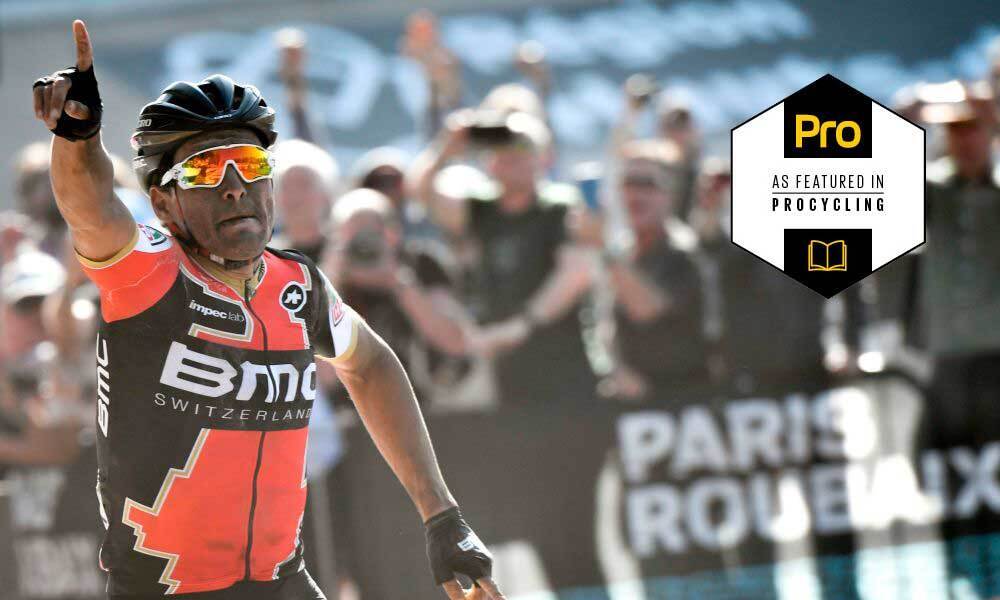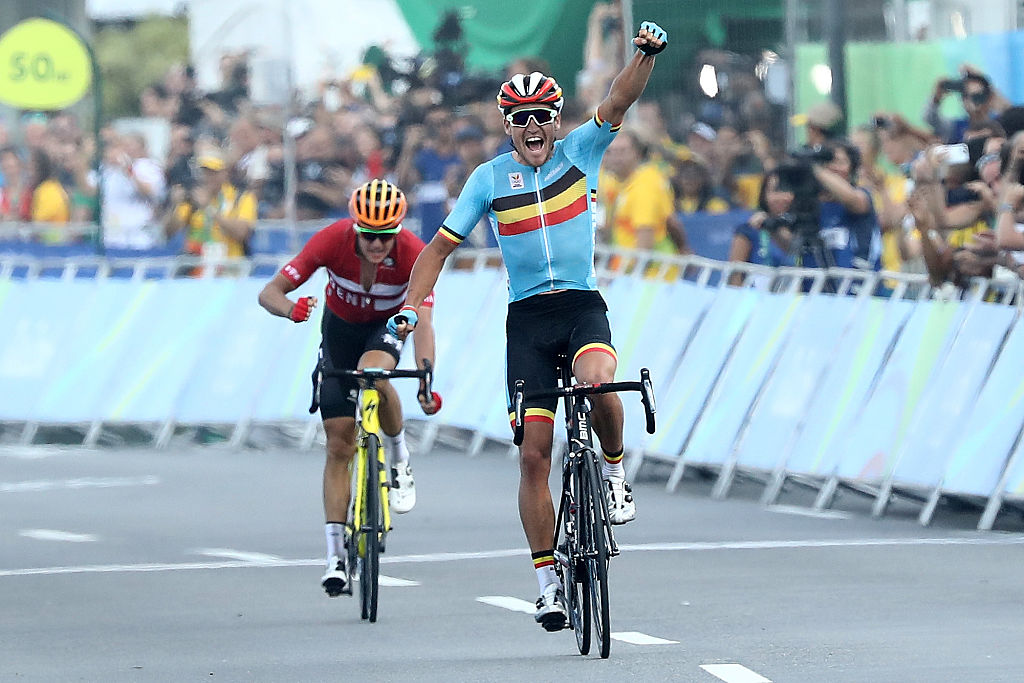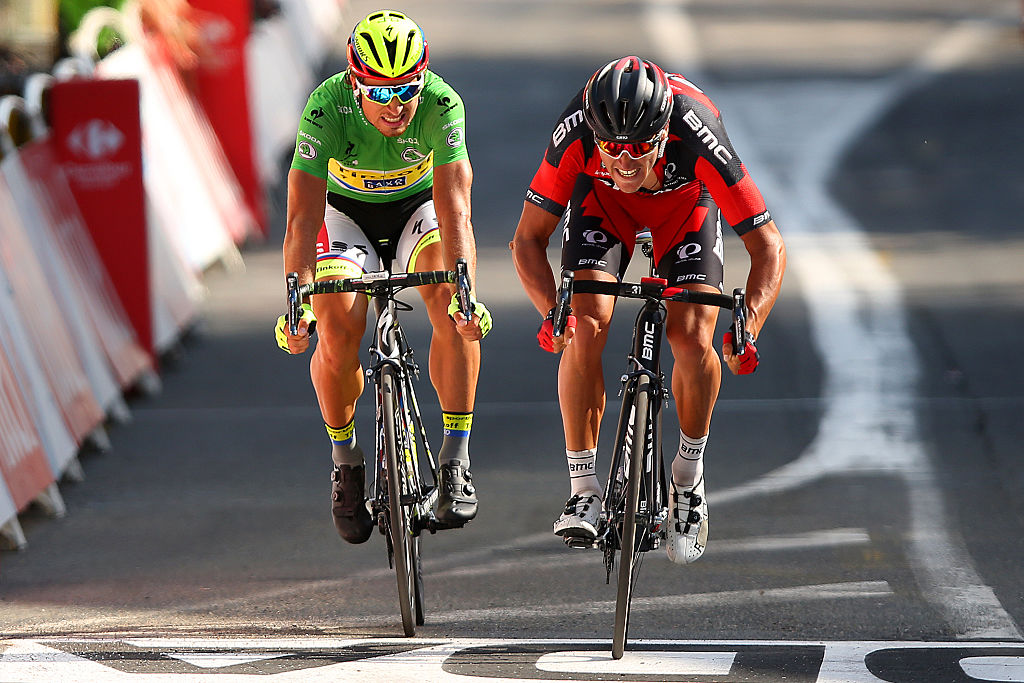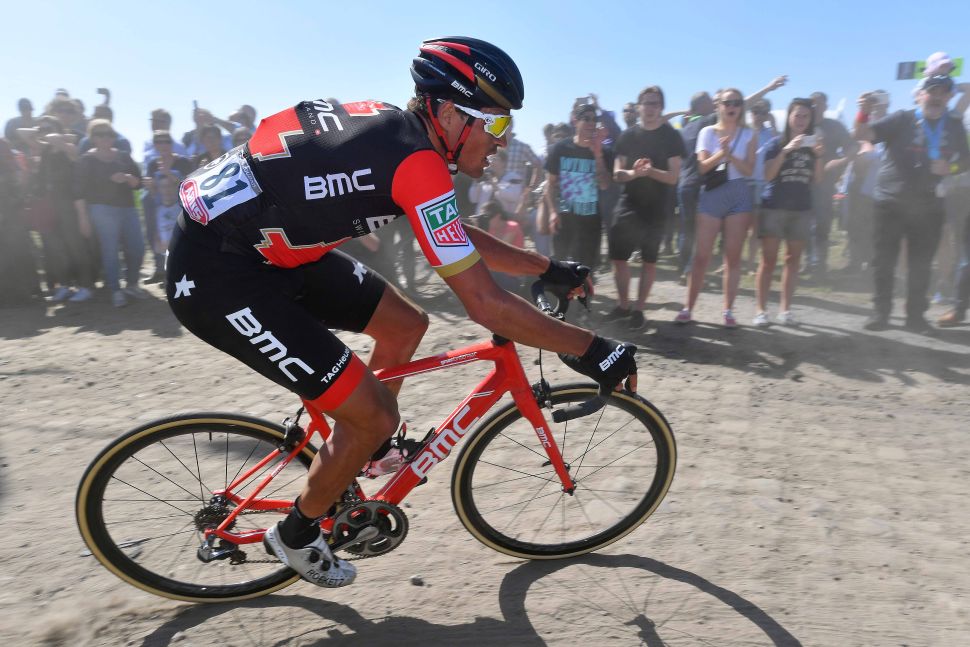Greg Van Avermaet: On top of the world
Talking Monuments with the Belgian Classics star in 2017

Procycling magazine: the best writing and photography from inside the world's toughest sport. Pick up your copy now in all good newsagents and supermarkets, or get a Procycling subscription.
The 2017 season saw Greg Van Avermaet finally clinch a debut Monument at Paris-Roubaix, amid a run of major spring wins that helped propel him to the top of the WorldTour ranking. Procycling met the Belgian Classics king at his home to find out what's next.
This article was taken from Procycling magazine, issue 257, in 2017
Dendermonde, a quiet Belgian town on the Schelde river located in the triangle formed by Ghent, Antwerp and Brussels – Belgium's three biggest cities – is basking in an unseasonal burst of late-autumn sunshine, the last warmth of the year. The blue sky and pleasant temperatures are quite unFlandrian.
Dendermonde is home to Greg Van Avermaet, Olympic gold medallist, WorldTour champion, Monument winner, achiever of top 10s – and local boy: he was born in Lokeren, the next town over. We're sitting in Van Avermaet's garden, which has an open and expansive view on to the cultivated fields of the East Flandrian plain – there's no real hill between here and the North Sea, 80 kilometres away.
"I don't like it too much here," Van Avermaet says, laughing. "For training, it's terrible – it's flat, and the weather is not really good, but it always feels nice to come home. I could live somewhere else, but this will always be my home."
He adds: "I think I'm really Belgian."
Get The Leadout Newsletter
The latest race content, interviews, features, reviews and expert buying guides, direct to your inbox!
Van Avermaet's house, midway through a renovation that has taken a while longer than planned, is out of bounds, so we're at a table in a broad expanse of grass which is being idly nibbled at by a robot lawnmower moving at random around the lawn. The mower, motorised and autonomous, sticks to our part of the garden, buzzing around our ankles.
"He's friendly. He always likes to be near people," jokes Van Avermaet.
The Belgian looks relaxed – non-team regulation and reassuringly unfashionable clothing, mid-morning bed hair and a few days' worth of chin fuzz suggest to me that he's in holiday mode, although he'll have to shave his legs one more time in anger before he really kicks back, for his impending trip to the Saitama Criterium.
Why wouldn't he be relaxed? 2017 has been his best season yet. The transition he was threatening to make through 2016, from perennial also-ran to big race favourite, was completed and he took a memorable spring quartet of victories. The Omloop Het Nieuwsblad, for the second year, was followed by the E3 Harelbeke, Gent-Wevelgem and Paris-Roubaix, each for the first time. He was also second at Strade Bianche and the Tour of Flanders. These followed on from 2016, when he won a stage at the Tour de France (going into the yellow jersey), took gold at the Olympic Games road race and victory at the GP de Montréal.

It seemed, by mid-April this year, that Greg Van Avermaet had learned to win. Since then, however, it's been quieter. He was ill in May, went to the Tour of Luxembourg in June undertrained and won it, but rushed his subsequent recovery, and was below par at the Tour de France. The winning form had gone – he didn't cross the line first again after June, but he settled back into his old habit of high placings – second in the Rodez stage of the Tour, eighth in San Sebastián, fourth at the BinckBank Tour, 10th in Plouay, second in Québec, seventh in Montréal and sixth at the Worlds.
"Other years, I was good in the Classics but never won, and was always good at the end of the year," he says. "This year, I won in the Classics but won less after the Tour. I got sick, and it took me to the end of the season to get to a good level, but I was never really like earlier in the year. It was like before – lots of top 10s and not winning."'I think I'm one of the best'
'I think I'm one of the best'
There isn't a rider in the peloton who targets the WorldTour classification. You could extrapolate from that and conclude that nobody wants to win the WorldTour, but that's not true.
It's a good competition to have won; it's just that even among the riders at the top of the classification, it's a by-product.
"It's more a fight with yourself, collecting points," Van Avermaet says. "It's never been an objective. At the start of the year, you don't say, 'Right, I'm going to try to win the WorldTour.' But I got so many points in the Classics period, and then I started thinking about it. All year long, I was collecting points – I am always there, and that is my strong point. If I'm not winning, I'm coming third or fourth."
This is one of the criticisms of the WorldTour – how to weight the value of a win in a Monument with that of a win in a Grand Tour and make a comparison, as well as comparing placings in races as diverse as Dwars Door Vlaanderen, Amstel Gold and the Tour of Guangxi. There was the unlikely but ridiculous prospect of Van Avermaet being on standby to go to the Tour of Turkey or Tour of Guangxi in case Chris Froome, only 130 points behind, went east for some cheap points. It might have been an entertaining battle, but it's a small measure of the WorldTour's status that neither rider extended their season.
For Van Avermaet, there is still a huge sense of achievement, although Alejandro Valverde, four-time winner of the WorldTour and the single best-suited rider in the peloton to the classification, would probably have given him a good fight if he hadn't crashed out of the Tour on the first stage.
"For me, it became a big thing. It's all through the year, and I know how hard it is to win because you have guys like Froome and Peter [Sagan] who are always there and always collecting points. It's a big thing to win, and it's nice to win it once because you want to prove to yourself you are the strongest rider in the world," he says.
Are you, I ask, the strongest rider in the world?
"I don't feel like it," he says. "But the ranking gives a good value of a rider, and I think I'm one of the best. People have to decide who they think is the strongest, but I have some strong points and am able to beat many of the guys."
You'd describe Van Avermaet's attitude towards some of his rivals as an inferiority complex, except he doesn't seem to have much of a complex about it.
"It's hard to say if I'm the best rider in the world," he says. "Peter Sagan and Chris Froome are pretty strong. They are probably better than me."
You can't compare Van Avermaet and Froome. Their ambitions are so different that they might as well be doing different sports. They clashed head-to-head once in 2017, on 14th stage of the Tour in Rodez, where Van Avermaet was hoping to repeat his 2015 stage win in the same town, and Froome was in the process of divesting Fabio Aru of the yellow jersey. Even then, it was less a clash than the pursuit by two individuals of their own separate goals that happened to take place in the same location at the same time. (Van Avermaet was second, Froome seventh.)
Van Avermaet and Sagan, on the other hand, have ambitions that overlap much more exactly. They often come first and second – Het Nieuwsblad (twice), Rodez in 2015, the GPs Montréal and Québec in 2016, a couple of Tirreno-Adriatico stages (along with the GC once) to take a few examples. Sagan's repertoire is broader than Van Avermaet's – the Belgian tends to avoid bunch sprints, although he is very fast.

"I think Peter is really strong and is hard to beat. It always looks so easy for him," Van Avermaet says. "I feel I have to work really hard and be really specific and focused. He is a little bit nonchalant; he looks unfocused, but that is his strength. He's such a big talent and is hard to beat in every kind of race. He's a good bike handler; I'm also good but maybe more normal – I don't do anything crazy, going through small gaps or doing bunch sprints.
"In the Classics, I'm also really strong and hard to beat, so that's where I get closest to him."
Van Avermaet's being hard on himself: in the 10 races in which the two riders have been first and second since 2015, he beat the Slovakian in seven of them.
'Gent-Wevelgem is not my kind of race'
Although it is an important, tough and atmospheric race, nobody gets too excited about the winner of Het Nieuwsblad. This is partly because it's so early in the season, but also because of the 'Curse of the Omloop'. No winner has ever gone on to win Flanders in the same year, al though correlation is not causality. But for Van Avermaet, it's a big race and he's been in the top six for the last six editions.
"It came to the WorldTour this year, with a bigger field, and, after the Tour of Flanders, it's the biggest thing in Belgium. It was nice to perform, and finally I've started winning races two times in a row, which gives me confidence," he says. "For me, cycling is easier than three or four years ago when I still had to prove myself. I used to be unsure how to win races.
"It's hard to say what has changed. I was surprised how easy everything went because other years I was struggling to win or finish on the podium. Maybe confidence is the biggest thing. The team believed in me and I believed more in myself."
At the E3, Van Avermaet escaped with Oliver Naesen, his regular training partner, and Philippe Gilbert on the Oude Kwaremont. Naesen was the weakest link – dropped on the final climb, the Tiegemberg, before fighting back – so the sprint was contested between Van Avermaet and Gilbert.
"It's a race that has never really suited me. If you look at my results, it's probably my worst race. I've only finished on the podium once, when I was really young," says Van Avermaet. "We worked well together. It was a nice group, because we had Oli, a guy I train with, and who is getting stronger every year. I didn't want to flick him – I wanted to bring him with me, but I also wanted to win the race. When Phil attacked on the Tiegemberg, I saw that Oli had been dropped. It was strange – you have to flick your mate who you ride with every day. But he caught us back up, so no problem.
"In the sprint, I was strong and believed in myself, but I had in mind that Phil could beat me if I did something wrong, so it was important not to make a mistake. Phil is pretty fast."
More about Gilbert later, but Van Avermaet was now on a roll, and he won Gent-Wevelgem in unusual circumstances. He'd forced the lead group away by attacking on the Kemmelberg, but on the run-in, Sagan tired of Niki Terpstra not contributing to the break and simply let Van Avermaet, along with Jens Keukeleire, just ride off.
"I was not expecting that," says Van Avermaet. "Gent-Wevelgem is not my kind of race. But Peter decided not to work and the guys from Quick-Step were not really riding. I did a pull, full gas, and then Jens passed me. I was thinking of going back to take my place in the line, and noticed nobody was there.
"For me, it was the perfect situation, but also a situation that might occur one time in 10 years. It was a big surprise."
The Tour of Flanders was a less happy experience, although he came second. He was out of position going into the Muur van Geraardsbergen, where a split put Gilbert in a dangerous group ahead of the peloton. Van Avermaet didn't panic, but when he, Sagan and Naesen launched themselves in pursuit of Gilbert on the final climb of the Oude Kwaremont, Sagan clipped a barrier and took all three down. Van Avermaet got back up, but Gilbert was too strong.
"I almost crashed before the Muur and had to brake. I was in 50th place, and told myself I was not going to get to the front so had to take it easy. I thought probably nothing was going to happen," he says.
"I joined a group on the way down and thought, 'I hope this is the front,' but I noticed there was a group away. Even then, I wasn't panicking. I was focusing on the last Kwaremont and Paterberg.
"If me, Peter and Oli hadn't crashed on the Kwaremont, we could still have made it. I mean, who has crashed on the Kwaremont in the last 10 years? I'm not angry with Peter – he made the effort, and that's racing. But I was able to stand up, check my bike, and nothing was wrong. I could go full gas. I was really strong, but Phil was a little too strong and finished it off.
"In my mind, the race was not over. You have to shoot me to make me stop."
Then came Paris-Roubaix. Uncharacteristically, Van Avermaet rode a conservative race, by necessity, since he feels it's a race that suits him less than the other cobbled Classics. The race was run off in good weather, and he won a five-man sprint in the Roubaix velodrome.

"It's not my favourite race. If I see a climb, I want to attack on it, but in Roubaix it's easier to sit in and follow the big moves by stronger guys," he says. "I was really conservative, and I was happy with my spring so far, and that also helped. It made it a bit easier to be conservative – I didn't have to close the gaps. I was expecting top 10 but winning was different."
Flanders ambitions
Van Avermaet and Gilbert were undoubtedly the riders of the spring, ahead of Michał Kwiatkowski, the winner of Milan-San Remo and Strade Bianche. Although both play it down, there's been a brewing psychodrama between the two Belgians for years, thanks to their overlapping ambitions and the fact that they spent five years riding for the same team, BMC. I'd asked Van Avermaet, partly jokingly, if he felt his spring had been better than that of Gilbert, who also won Amstel Gold, and he partly jokingly but very quickly said, "Yes." And laughed.
"Phil is the same kind of rider as me," he says. "He's older and has a better palmarès, but I was always a guy who wanted to be a team leader. My goal was to be BMC team leader and winning Classics."
Gilbert leaving for Quick-Step made life a lot less complicated. Van Avermaet now thinks they can both attack and work together, whereas in the past if one rider attacked, the other had to sit back.
"I'm happy Phil is riding with Quick-Step. If you're in the same team, you have to sit and wait. He's a great guy and we never had a conflict outside the race, but for me sometimes he was the wrong guy in the wrong position and that can sometimes make a conflict."
Van Avermaet's all-round talents – he has finished in the top 15 of every major one-day race, and in the top 10 of most of them – have caused fans to wonder how many more monuments he could win.
"I've been seventh in Liège, and I was 11th this year. It's a race that I like, and on the last climb this year, I was still with Valverde and those guys. With one kilometre to go, I was still in second position."
But Van Avermaet knows where his ambitions lie. Next year's target is the Tour of Flanders, above all else.
"That's the only thing. Maybe Strade Bianche. The two races I was second in this spring, I would like to win. I can win – if I didn't crash in Flanders, I would probably have won it. I always thought that the Tour of Flanders or Amstel Gold should be the races that fit me the best, but I've never won them."
Winning has finally started to become a habit for Van Avermaet. He's no stronger than before, he says, but his tactical nous and confidence have been increasing.
"It's not easy. It still hurts. But it's been different this year. It is easier. Before, I was always looking at myself from the outside and overthinking. But I've started taking the right decisions in the finals. I've been surprised winning could be that easy."
Procycling magazine: the best writing and photography from inside the world's toughest sport. Pick up your copy now in all good newsagents and supermarkets, or get a Procycling print or digital subscription, and never miss an issue.
Follow @Procycling_mag on Twitter.
Edward Pickering is Procycling magazine's editor. He graduated in French and Art History from Leeds University and spent three years teaching English in Japan before returning to do a postgraduate diploma in magazine journalism at Harlow College, Essex. He did a two-week internship at Cycling Weekly in late 2001 and didn't leave until 11 years later, by which time he was Cycle Sport magazine's deputy editor. After two years as a freelance writer, he joined Procycling as editor in 2015. He is the author of The Race Against Time, The Yellow Jersey Club and Ronde, and he spends his spare time running, playing the piano and playing taiko drums.